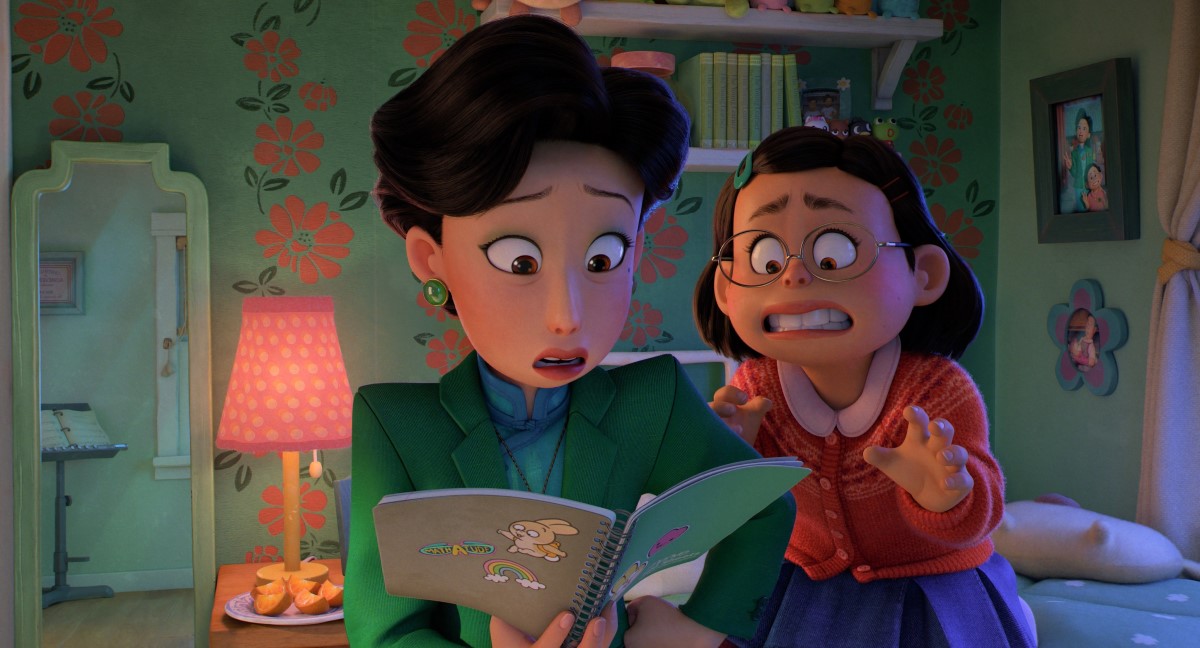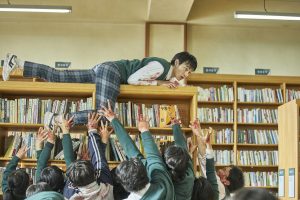All images: Disney+
Turning Red tells a familiar (if you’re not a white male that is indignant about the dearth of white males in the story) tale of parental expectations and the need for love from vulnerable children—well, at least if you live in Singapore. And also if you don’t condemn other culture’s practises as “demonic”, as one New York pastor did. Now that the disclaimers are done, let me reiterate—yes, Turning Red is a familiar story, and resonates with almost everyone I know in real life who has watched it (although, again, disclaimer, this is all anecdotal).
Turning Red is a Pixar animation that revolves around a 13-year-old Chinese Canadian girl, Mei (Rosaline Chiang), and her burgeoning puberty which turns her into a giant red panda whenever her emotions get the best of her. Fortunately, her group of close female friends are there for her, but Mei still has to navigate her own journey as she learns about her lineage. It’s a comedy, and although I am not a girl who can turn into a giant red panda, I liked it.
Mostly, it’s because Mei feels this intense pressure to live up to Ming’s (Sandra Oh), her mother, perfect standards, which, in turn, came about as a result of having to live up to her own mother’s (Mei’s grandmother’s) impossible standards.
And while I could identify with having to live up to the sky-high standards of my parents, it also shed light on the fact that my parents could also have faced impossible standards from my grandparents, and them from my great-grandparents—ad infinitum.
It can be traumatic. Trauma doesn’t always mean that you have to have survived some life-threatening situation. A traumatic event is one that causes physical, emotional, spiritual, or psychological harm. So yes, Ming’s impossible standards (okay, all of our parents’ impossible standards) can be traumatic if one isn’t prepared for it. And at a tender age when one is going through puberty, how can one be prepared for it?
And as Turning Red shows, Ming’s behaviour is a result of experiencing the same thing as a child. In a way, she’s projecting the emotions, or trauma, that she felt onto Mei. And for all we know, Mei’s grandmother could have faced similar pressures from Mei’s great grandmother. In the film, the origin of Mei’s transformation is the result of an ancestor’s wish to have the power to protect her loved ones, which again, is another source of trauma—intentional or not.
There’s a name for this sort of trauma—intergenerational trauma. And as you can see, it can be borne out of love or a desire to protect the ones you love. But all that suppression can be harmful which is why it’s traumatic. So these mindsets, these attitudes, they get passed from grandparent to parent to child, with nary a single one questioning whether it’s deleterious or not.
So what does Turning Red have to do with Will Smith? His infamous slap of Chris Rock has been dissected and analysed and covered to death on the media—was it real or was it staged? I don’t know Will Smith personally but I’d like to give him the benefit of the doubt, the way I would give a stranger the benefit of the doubt. Plus the number of f-bombs he unleashed isn’t really something you do for primetime television publicity.
Some have pointed out that Smith’s actions could be a result of intergenerational trauma. Still, Violence is violence, no matter what form it takes and Smith’s actions were violent in nature. But when I read about Smith’s childhood, how he saw his father abusing his mother, it struck a chord with me.
I remember being woken up one night when my own mother came running to my room crying that my father had hit her, and that sort of thing is something that you will absolutely never forget. I still have nightmares about it, 30 years later.
I have no children, so thankfully no offspring will bear the brunt of the intergenerational trauma I have faced. But watching Turning Red made me think, for the first time, if my parents could have had a less-than-perfect childhood (my grandparents treated me wonderfully, as all grandparents do, so I extrapolated that treatment to everyone they know). And while I may never know what my parents faced, I am fairly certain they faced something.
So while we’re dissecting Smith’s experience and heaping a lot of blame onto his father, maybe we should take a step back and wonder if his father’s father did the same. That’s how intergenerational trauma works, after all. It’s not an excuse for Smith’s actions, and I feel that whatever happens, he should be held accountable for it. But it’s a step towards understanding how he could be emotionally damaged—in fact, how we could all be emotionally damaged.
And understanding is the first step, no?
So, Mr Smith, I hope you watch Turning Red. I hope that you find the answers that you seek. I hope that you get better. Because it is a good film and it’s about love, which you espouse. But it’s also about intergenerational trauma, and how the best of intentions may sometimes lead us to causing so much harm that we never wanted to.
Mr Smith, please watch Turning Red.
Turning Red
Director: Domee Shi
Writers: Julia Cho and Domee Shi, with story credits for Sarah Streicher
Voice Cast: Rosalie Chiang (Meilin “Mei” Lee), Sandra Oh (Ming Lee), Ava Morse (Miriam Mendelsohn), Maitreyi Ramakrishnan (Priya Mangal), Hyein Park (Abby Park), Orion Lee (Jin Lee), Wai Ching Ho (Wu), and Tristan Allerick Chen (Tyler Nguyen-Baker).
Watch here.







